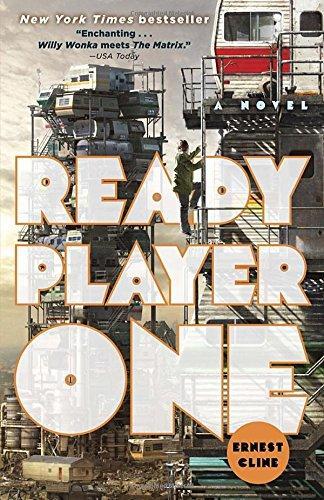kyonshi reviewed Ready Player One by Ernest Cline
Review of 'Ready Player One' on 'Goodreads'
4 stars
There was one point in this novel where I was grinding my teeth. It was spelled out for the characters how to find the Jade Key to go further in their treasure hunt, and somehow I got it in an instant and those ubergeeks who knew everything about the creator of the treasure hunt and his way of thinking keep on missing it for weeks. Old run-down house and collecting trophies! How hard can it be?!
Which means most likely that I am a bit too geeky in some way. At least I can't quote WarGames from memory, but at least the Monty Python challenge later would have been able for me.
Ready Player One is about a treasure hunt in a virtual reality (OASIS) which by the point when the novel takes place has taken over all other MMORPGs and works as most peoples' workplace, school, entertainment, and what-have-you. There is a reason for this of course: the real world is rife with hunger and desperation, slavery has been reintroduced by way of indentures for debtors, gasoline has run out so quickly that whole streets are filled with useless cars, and trailer parks have grown into stacks of trailers all over each other. There is a good reason why the people in this world prefer the virtual reality to their own. And then the founder of OASIS dies and leaves a game as an inheritance: a treasure hunt inside OASIS, whoever manages it will gain control over the company; in end effect whoever wins will be the richest person in the world.
This leads to a subculture called the gunters who hunt for this treasure, and for a revival of 1980s pop culture (because the hints for this treasure hunt are made up of obscure pop culture references). And then nothing happens for a few years, until the main character (a kid from the stacks with a pithy 3rd level avatar called Parzival), manages to get on the high score board as its first entry.
The book reads like a well-written 1980s adventure movie, and it is easy to imagine all the different characters and places described in it by virtue of them being references to 1980s American culture. Sometimes these references are laid on a bit thick, but in most places they read just fine. The issue with the plot is that the reverence it gives to 1980s movies also extends to itself: there were barely any surprises in there, all the plot turns and twists were visible from far ahead, and it was sometimes a bit too clear when something would happen, even if I didn't know what exactly it would be. In the end the moral of the story is that not everything can be online, and that there must be a real world for people as well, which is just such a 1980s cartoon moral. Of course its fitting.
The novel might not be the classic that it has been heralded as (I gather most of the reviewers are from the same generation that is celebrated in it), but its a nice, fast science-fiction adventure.

